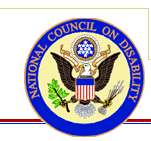| |
National Council on Disability
Public Consultation
June 16, 2008
Emerging Trends and People with Disabilities: Public Consultation
The National Council on Disability (NCD) is gathering public input for a study of emerging issues and trends affecting the lives of people with disabilities. Information gathered will be used in the development of NCD's next annual progress report to the President and Congress, "National Disability Policy: A Progress Report," which is required by Section 401(b) of the Rehabilitation Act of 1973, as amended.
The purpose of this public consultation is to gather input to inform NCD's assessment of the status of the nation in achieving policies that guarantee equal opportunity for all individuals with disabilities, and empower individuals with disabilities to achieve economic self-sufficiency, independent living, and inclusion and integration into all aspects of society.
We are seeking input on disability issues such as health, housing, employment, insurance, transportation, assistive technology, recreation, emergency preparedness, training, prevention, early intervention and education. Your input will be used in the development of recommendations including, but not limited to, recommendations for changes in legislation, regulations, policies, or programs, as appropriate. NCD seeks input from individuals with disabilities, organizations representing a broad range of individuals with disabilities, and agencies interested in or serving individuals with disabilities.
How can you participate in our public consultation process? We will briefly outline the purpose, key issues and key policy topics of interest.
If you are interested in participating in this public consultation, you may want to respond or react to any of the policy topics of interest. If you do want to react or respond, please follow these basic guidelines:
- Be brief: Use one short sentence to explain each point you want to make, as this will help us understand your issue or opinion. You can add more detail afterwards if you wish.
- Focus on what is important to you: Write about the policy topic(s) you care most about first. If you want to make more detailed comments, put them in an appendix to your response or in a separate document.
- Provide evidence: Your comments will be more convincing if they are supported by evidence or information. If you are responding by regular mail or email, send in copies of supporting documents rather than information about where to find them.
- Submit your response as soon as possible: The earlier you send in your views, the longer we have to consider them. This is particularly important if you are providing new information or evidence.
- Tell us who you are: Say whether you are commenting as a private citizen, representing other people, or on behalf of an organization.
- Let us know if you want your response to be kept confidential: NCD may publish your views as part of the results of the consultation. If you do not want us to do so, state this clearly in your response.
- If possible, please react or respond by email: You can even insert your comment(s) or reaction(s) into this document following the questions you wish to answer or the subjects you want to discuss from the list below. If you are not able to respond by email, please share your written comments with us in a format that you choose, but please identify the “policy topic” you are addressing at the beginning of your response.
Now we want to hear from you. Please provide comments and specific examples about any or all of the following:
- Describe the most current and/or emerging issues facing people with disabilities.
- Identify what you believe are the personal challenges of living with a disability and individual barriers to full participation - e.g., finding and keeping a job, lack of accessible housing, transportation or access to the technologies that assist people with disabilities in independent living and access to the workplace.
- Address how opportunities for people with disabilities are affected by the attitudinal challenges that still exist among people who do not see the value of potential contributions of people with disabilities to society.
- Provide your assessment of how well existing government programs address the emerging issues and needs of people with disabilities.
- Address systemic challenges that exist in areas such as employment, education, housing, transportation, health care, etc.;
- Explain how the Federal government and its partners should distribute funding resources to better meet the future needs of people with disabilities, including describing programs and services that will be needed to address the short- and long-term needs of people with disabilities.
Your comments will help NCD provide a guide for America’s programs and services to be modernized to reflect the changed and changing needs of people with disabilities in our communities.
Please send your information to NCD by August 7, 2008, in one of two ways:
Email to:
ncd@ncd.gov
Type "Emerging Trends" in the subject line
Or by U.S. mail to:
National Council on Disability
ATTN: Emerging Trends Committee
1331 F Street NW, Suite 850
Washington, DC 20004
Potential subjects:
- Healthcare
- Housing
- Employment
- Insurance
- Transportation
- Assistive Technology
- Recreation
- Emergency Preparedness
- Training
- Prevention
- Civil Rights
- Crime and Abuse
- Parental Rights
- Early Intervention
- Education
- Youth Transition
- Foster Care, or
- Any Other Subjects You Choose.
Thank you.
|

